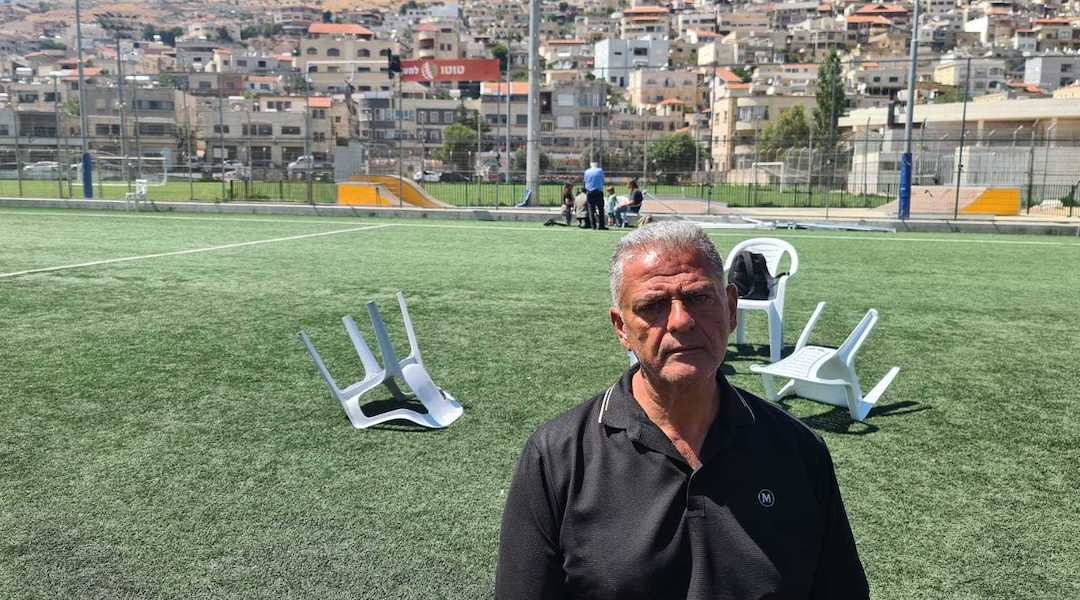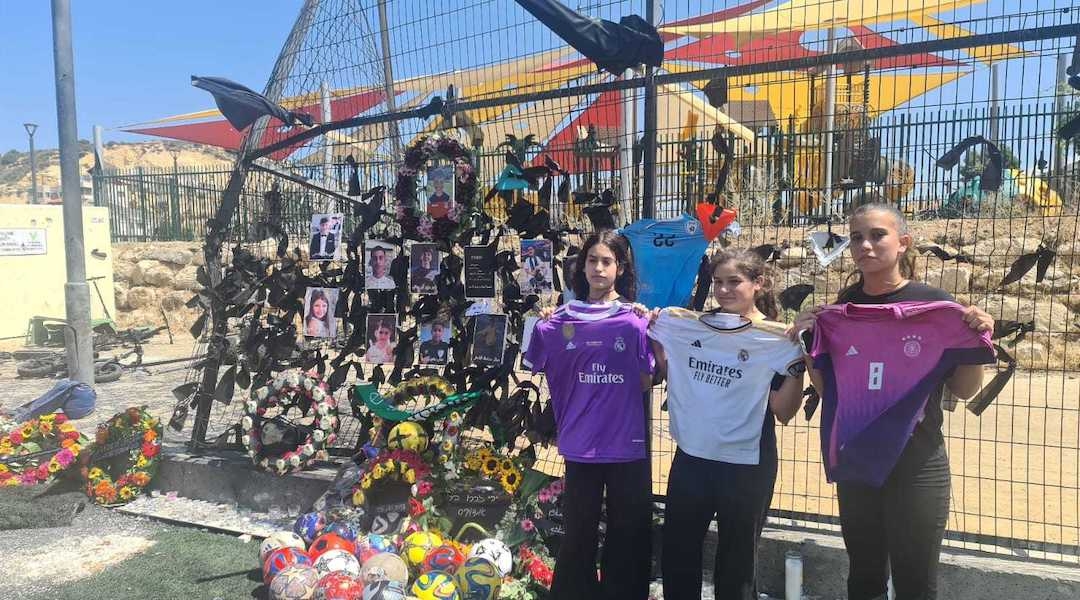MAJDAL SHAMS, Israel – Nisreen Abu Saleh scoured the singed turf of the soccer field surrounding the crater where her son, Yazan Nayeif Abu Saleh, had been killed by a rocket three days earlier, along with 11 other children and youths in this Druze town.
Picking up a tiny piece of black fabric, Abu Saleh let out a strangled sob.
Those around her, dressed in black, massaged her arm and whispered in her ear. Turning to them she cried, “I know this is from his pants, I’m his mother!”
Behind her, a photo of a smiling Yazan, 12, with a drum wedged between his legs, hung alongside the rest of the victims. A row of wreaths lay under the images, with inscriptions of condolences from a motley collection of well-wishers: high-tech giant Microsoft Israel, the newly formed Labor-Democrat party, the American Jewish Committee.
Throughout the day on Tuesday, more wreaths were added as increasing numbers of well-wishers arrived in the town. Among them were a group of interfaith leaders, pro-Israel influencers, delegations from the police, and scores of unaffiliated individuals who drove in to the resort town in the northern tip of the Golan Heights, close to the Lebanese and Syrian borders and just spitting distance from the ski slopes of Mount Hermon, to pay their respects. Since Sunday, thousands of Israelis have donated more than $300,000 to a crowdfunding campaign for the bereaved families.
An elderly woman from Tel Aviv spoke to Adham Shams, a resident of Majdal Shams who did not lose any relatives in the attack. “I couldn’t believe an 85-year-old woman would come all the way here, during a war, just to pay respects,” Shams said after the encounter. “She told me, ‘How could I not come?’”
Like many of the residents, Shams said he felt an outpouring of love and support from all over Israel in the wake of the attack. Although many Druze in the Golan hold Syrian citizenship, and are from a minority that makes up less than 2% of Israel’s population, Israelis have collectively grieved the dead youths and spoken of the strike as an Israeli national tragedy.
“I said to our Druze brothers and sisters: We are brothers. We have a bond of life,” Israeli Prime Minister Benjamin Netanyahu, who had visited the site of the strike, said in an address to the nation on Wednesday. “That bond becomes tighter in days of pain and mourning.”
Druze citizens who live in northern Israel serve in the Israeli military, considered a rite of passage in the country. It was from Jewish Israeli friends from the country’s north, most of whom have been evacuated to the center of the country, that Shams felt the warmest embrace, receiving dozens of messages after the attack.
“They are more than my brothers,” he said.
The Israeli military chose not to include Majdal Shams in the evacuation orders for border communities because it does not sit directly on the border with Lebanon. Until Israel conquered the Golan in the 1967 Six Day War, Majdal Shams was part of Syria. Israel annexed the area, a strategic high ground, in 1981, but many Druze refused Israeli citizenship, some out of concerns for close relatives still in Syria.
That is changing. Since the civil war in Syria in 2011, more and more Golan Druze have been applying for Israeli citizenship. According to Iyal Ghanem, in Majdal Shams and four other Druze villages abutting the Syrian border, the younger generation is slowly severing ties with the regime in Damascus.
“People aren’t studying in Syrian universities anymore and even the older generation no longer goes to Shouting Hill,” he said, referencing a remote hilltop where residents used to hold cross-border conversations with relatives on the Syrian side. Smiling, he added, “These days, WhatsApp works just as well.”

Majdal Shams resident Hassan Shakir at the site of the attack. (Deborah Danan)
Still, some residents get their news from Syrian broadcasts and are questioning Israel’s version of Saturday’s events. Tulei Abu Jabal, 14, asked Ghanem if it was really a Hezbollah rocket that killed her friends as well as her cousin, Gajabara Ibrahim.
“Why would they attack us? We don’t fight. We want peace for everyone,” Abu Jalal said.
Unlike the rest of Israel’s Druze community, Syrian Druze do not enlist in the Israel Defense Forces, but according to Hamada Ghanam, a northern battalion commander, even that is changing, with some young people joining an accelerated military induction program.
Majdal Shams resident Hassan Shakir said most people in town believe that the rocket came from Hezbollah but feels that there were questions that remained unanswered. Residents of the town arrived on the scene within minutes, he said, and while human remains were scattered everywhere, he said they reported that traces of the rocket seemed to have disappeared.
But pieces of shrapnel recovered from victims’ bodies and the shape of the crater all indicate that the projectile used in the attack was an Iranian-made Falaq rocket, according to experts cited by AP. U.S. officials also have said they believe Hezbollah fired the rocket.
The intended target could have been military assets in the area, Shakir said, including a nearby community center where Israeli soldiers had been stationed. “What does it matter anyway?” he said. “Knowing what happened won’t bring those children back.”
Shakir, who lost three cousins in the attack, is a contractor specializing in the construction and installation of playgrounds and sports fields like the one destroyed on Saturday.
“This was the center of life for these kids. They were obsessed with soccer,” he said. “Whenever anyone was looking for their kid, chances are they would come here first.”
Now, the pain is raw and sharp. His cousin Adham Safadi “collected pieces of his daughter Finis in a plastic bag,” Shakir recounted.
Shakir also feels the warmth shared between the different communities in northern Israel. On a recent visit to Tel Aviv’s Carlton hotel, Shakir said all the evacuated residents from the northern city of Kiryat Shmona welcomed him with open arms. “We are like family, everyone knows me,” he said.
According to Moti Hassin, a Jewish Israeli from Kiryat Shmona who is currently evacuated and living in a Tel Aviv hotel, Golan Druze are significantly overrepresented in various sectors, including commerce and medicine, within his hometown.
“They’re our dentists, our hairdressers, our builders, they have homes in Kiryat Shmona,” he said. “We live fully together.”
To Hassin, it did not matter that some of those Druze are citizens of Syria, a hostile neighbor. “You need to understand, people from the upper north are one people,” he said. “We have been since 1967.”
Part of their bond, Hassin said, is a shared anger at the Israeli government’s perceived abandonment of the north, Druze as well as Jews, many of whom have been housed in cramped hotels with no end in sight. When Netanyahu visited the site of the attack on Monday, he was jeered by locals, and called a “war criminal.”
“I feel like we’re the same as the Druze,” he said. “Just like the government doesn’t see the Druze, they don’t see us.”
Shams, the local resident, likewise expressed his identification with Israeli society. “God should save all of the people of Israel,” he said. He repeated a slogan that has become popular in Israel since Oct. 7: “Together, we will win.”
Amir, a soldier in reserves, said news of the attack sent shockwaves in his battalion. He shared a photo of a soldier holding a Druze flag. When asked if he recognized the internal distinctions between Druze in the Golan and elsewhere in Israel, Amir responded that it was irrelevant to him.
“I think they will conscript eventually,” he said regarding Golan Druze who do not enlist. “Not now, they are still angry, and rightly so, but one day. Either way, it doesn’t matter. They are still our brothers.”
Jerusalem resident Sasha Silber similarly overlooked the distinctions.
“These are our neighbors and part of our community,” Silber said. “This is our loss as well.”
On the soccer pitch, Tulei Abu Jabal and her two cousins, Nor and Rena Ibrahim, clutched soccer jerseys belonging to their cousin, Gajabara Ibrahim. Ibrahim, 11, was buried a day earlier — a full day after the burial of the other victims, because it took more than 30 hours to identify his DNA from blood traces. Residents said Ibrahim likely sustained a direct impact from the rocket.
Abu Jabal said the family found small comfort in the fact that Ibrahim died on a soccer pitch.
“His biggest dream was to be a professional soccer player,” she said, adding that her relatives in Syria had committed to establishing a soccer field in the victims’ names.
Abu Jabal drew spiritual strength from the Druze community’s belief in reincarnation and the notion that everyone has a predetermined time to die, while also feeling deeply moved by the widespread support from Israelis. “Everyone is united in this tragedy,” she said.
JTA has documented Jewish history in real-time for over a century. Keep our journalism strong by joining us in supporting independent, award-winning reporting.






